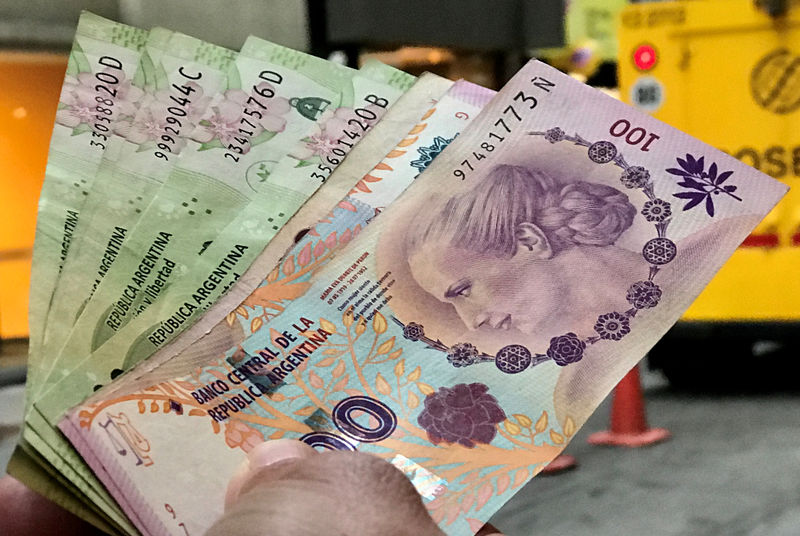 © Reuters. FILE PHOTO: A man shows Argentine pesos outside a bank in Buenos Aires’ financial district
© Reuters. FILE PHOTO: A man shows Argentine pesos outside a bank in Buenos Aires’ financial districtBy Gabriel Burin
BUENOS AIRES (Reuters) – Argentina’s currency extended its week-long rally on Tuesday as investors swarmed toward peso-denominated debt offered by the central bank at nose-bleed high interest rates, even as economists worried over the bank’s growing indebtedness.
The central bank began offering short-term notes called “Leliqs” with interest rates of about 70 percent at the start of the month to encourage Argentine banks to invest in peso- denominated assets rather than seeking the safety of the U.S. dollar. The strong dollar has fueled soaring inflation in Latin America’s third biggest economy.
It traded at 37.2 pesos to the greenback on Tuesday. The peso
Economists, however, were concerned over the high rates carried by the notes and see the issuance of the new Leliqs as a risky maneuver that could backfire and saddle the bank with too much debt.
With every fresh sale of Leliqs, the bank’s liabilities grow. The strategy still may prove successful if the expected depreciation of the peso over the year ahead increases the value of the bank’s dollar reserves.
Guido Lorenzo, an economist at local consultancy ACM, said the danger was the central bank’s rate of indebtedness outpacing the rate at which its dollar reserves are depreciating.
“If this happens the central bank is going to end up with some terribly high debt obligations,” Lorenzo said.
The peso sell-off started in May, when foreign investors grew concerned about Argentina’s ability to pay its debts and dumped what had been a rapidly growing inventory of short-term central bank notes called “Lebacs.”
The Leliqs are offered only to local financial institutions, which are subject to reserve requirements that would block them from rushing out of the short-term notes and causing a fresh run on the peso.
The central bank sold 82.996 billion pesos ($2.2 billion) in Leliqs at an average annual interest rate of 73.524 percent on Monday with more expected to be issued on Tuesday.
The currency is seen plummeting about 19 percent to 47 to the dollar over the next 12 months, according to a poll of economists by Reuters last week. The bank says it will keep interest rates above 60 percent until December.
The International Monetary Fund has cut its global economic growth forecast for this year and next, citing factors including capital outflows and tighter financial conditions in emerging markets like Argentina.
Fusion Media or anyone involved with Fusion Media will not accept any liability for loss or damage as a result of reliance on the information including data, quotes, charts and buy/sell signals contained within this website. Please be fully informed regarding the risks and costs associated with trading the financial markets, it is one of the riskiest investment forms possible.
Source: Investing.com




























